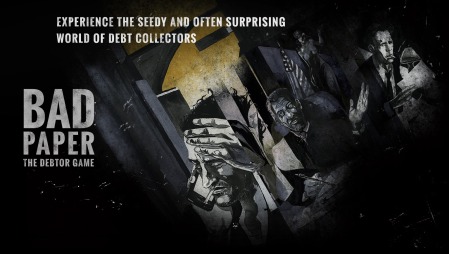Jake Halpern wrote a New Yorker article, and then a book, Bad Paper (which I haven’t read), about the debt collection industry. He was interviewed by Bloomberg’s Megan McArdle.
My mom was getting hounded by a debt collector for a bill that she did not owe. She eventually paid it just to get him to stop harassing her.
I started investigating and found out that much debt-collection activities were in my hometown of Buffalo, New York. I ended up writing a profile on a Buffalo-based debt collector who bought and sold and collected on debt for pennies on the dollar; that story ran in the New Yorker.
That New Yorker story got optioned by Brad Pitt’s production company. So I went back to Buffalo with the screenwriter.
No one wanted to talk to a journalist back when I was doing the New Yorker piece, but now that I was with Brad Pitt, everyone talked. One night, the screenwriter and I go out to dinner with a banker and a former armed robber who had gone into business with one another.
They tell me an incredible tale. They purchased $1.5 billion worth of bad debt for pennies on the dollar. Their aim was to make a fortune. All goes well on this unlikely venture until some of the debt is stolen and the former armed robber must delve into an underworld where debt is bought and sold on street corners. This quest ends in a showdown with guns in the inner city of Buffalo, New York.
The world Halpern describes is lower on the economic food chain than the one described by Matt Taibbi in The Divide, but the process is basically the same. A lender decides it is not worth the effort to collect on certain bad debts, and sells the debt to a collection agency for pennies on the dollar.
The problem is the lack of reliable information as to what is owed and for what. Sometimes the collectors don’t know how much is principal and how much is accrued interest. Sometimes unscrupulous lenders will sell the same debt to several collection agencies.
Halpern said he wound up having more sympathy with debt collectors than he expected. It is one of the few occupations open to convicted felons. The central figure in his New Yorker article was a former cocaine dealer trying to go straight.
What does he think needs to be changed about debt collection?
First, banks and other original creditors need to start providing detailed documentation — like monthly statements and original signed contracts — so that BOTH collectors and debtors have accurate, reliable information about what is owed.
Second, judges need to be very careful not simply rubber-stamp default judgments against debtors for debts that are suspect and that lack proper documentation.
Third, we need a system in place to keep track of who owns what debt. Can you imagine a world where cars — for example — were bought and sold and there were no VIN numbers, no reliable chains of title and no DMVs to keep track of everything? It would be INSANE. But that is, to a great extent, the way the buying and selling of consumer debt operates in the U.S.
Finally, I would boost the budget of the CFPB [Consumer Financial Protection Board]. Here is some context: The CFPB’s budget is equivalent to just 2 percent of what JPMorgan Chase set aside in reserves for its litigation expenses in 2013.
I suspect that, if debt collectors had to provide documentation that the money was really owed and otherwise comply with the law, their business would not be viable.
This would mean some debts would not be collected. I think this would be a good thing, not a bad thing—better, at any rate, than poor people being hounded to pay amounts many times over what they originally borrowed, and may not really owe in the first place.
LINKS
An Interview With the Repo Man by Megan McArdle for Bloomberg News.
Paper Boys: Inside the Dark, Labyrinthine and Extremely Lucrative World of Consumer Debt Collection, an excerpt from Jack Halpern’s Bad Paper in the New York Times Magazine.
Pay Up: A debt collector struggles to stay out of debt by Jake Halpern for The New Yorker (2010)
Bad Paper: the Debtor Game. By clicking on the link, you can role play as Debtor or Collector in this on-line game.
[Update 10/31/14] I have now read Bad Paper and I recommend it. In addition to the reforms mentioned in the original post, I would prohibit the sale of debt by anyone except the original creditor; that is, debt could only be sold once.
Tags: Buffalo, Consumer Debt, Debt Collection, debt collector, debt collectors, New York


October 21, 2014 at 6:23 am |
Apart from breaking your knee caps, what can anyone really do about someone who won’t pay an old debt, especially if it’s been sold a few times?
At that point, how can the collector even know if the debt they sold is real? You’d think people would be forging fake debt records or artifacts and selling those too.
LikeLike